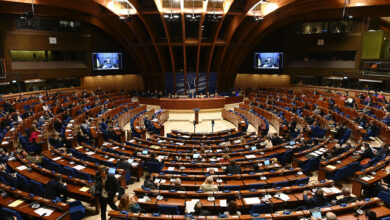Prime Minister Essam Sharaf said Thursday that his cabinet will update and reactivate a 60-year-old law to prosecute officials for what it specifies as “political corruption”.
Law 344/1952, which has been dubbed the Treason Law, had been deployed to try political officials after the 1952 political uprising.
Crimes punishable under the law include a government official’s abuse of power for his or her own interests, or for the interests of any company, institution, public authority or body. The law also encompasses financial crimes, including directly or indirectly altering the price of property goods, crops, securities or any other government or financial securities listed on the stock exchange and in the markets, for his or her personal benefit.
Government officials may also be punished for abusing their power to achieve better jobs for themselves or others.
“The Ministry of Justice will review and finalize the draft Treason Law in two weeks,” Sharaf said in a televised speech after his cabinet was sworn in on Thursday. “It will help us get rid of all those who had manipulated political life.”
Some political groups have called to activate the controversial law on the grounds that almost all former officials' trials since the outbreak of the revolution have only been related to financial corruption.
Some human rights organizations, however, disagreed with the idea.
The Cairo Institute for Human Rights Studies issued a statement Tuesday saying that it rejected the use of the Treason Law, and instead voiced support for “a bill [to] be swiftly drafted that includes the establishment of an independent judicial committee to authorize a program for transitional justice.”
Transitional justice refers to a practice in which countries undergoing political transitions prosecute past human rights violations.
A transitional justice initiative, which would require the establishment of a special committee or tribunal, has support from many in the human rights advocacy community, but would likely be more complicated than simply updating and reactivating a 59-year-old law that was once used as its own method of transitional justice.
The Treason Law allows punishments ranging from removing the convicted official from office, political parties, parliament or any state council, to banning the official from running for election or being nominated to any government body or council for a minimum of five years from the date of the sentence.
More severe sentences can include imprisonment from three to ten years or the revocation of citizenship.
With questions remaining about the ruling military council’s dedication to trying officials from the deposed Mubarak regime, the reinstitution of the Treason Law may face more hurdles in the future.




